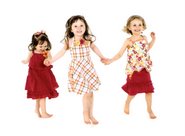WORKING WITH GRIEF
I was grocery shopping yesterday (fantastic feat when you forget you have ALL your soccer equipment in the back of your van when you go to load your groceries), and in the check-out, I saw the newest "People" magazine. One of the featured articles was Holly Robinson Peete discussing her son's autism.
Any time I see an article on a magazine, or on the internet about autism, I always feel compelled to read it. Well I mean minus the research studies (I'm sure all autism parents read those when they publish). But it's more the social stories I'm talking about. Reading about other people in a similar situation as you, talking about their child and their struggles. So you know I bought it and later in the afternoon, sat on my couch and read it. I have to say this: it amazes me how every parent seems to go through the same experience. It doesn't matter who you are, whether you are just the average Joe or a famous celebrity. We all breakdown to the same place, and go through the same emotions: shock, denial, anger... That immediately makes me think of the five stages of grief by Elizabeth Kubler-Ross. For those of you not familiar with this, it is the psychological explanation of the emotional stages when dealing with grief over death. It's always interested me how closely the two scenarios seem to command the same stages of dealing with grief. So my question is: is dealing with the "loss" of your child to autism the same as dealing with the grief of death. Yes I realize this is not a comparison. In autism, you still have your child (this in no way minimizes those who have actually lost a child). I'm specifically talking about the grieving process; not the situation that triggers it. And what I have found is most families I read about seem to go through this process.
When Kierra was first diagnosed, I was expecting it. I knew in the back of my mind months before we even started the evaluation process that this would be the verdict. I tried to emotionally prepare myself as best I could. Still, I was still semi-floored when I skipped through the evaluation papers to the very last page where it said, "Kierra is diagnosed with Austism Spectrum Disorder, mild to moderate range." Maybe it was seeing it in print that made it real. But there it finally was. Of course as soon as everyone left I had a major breakdown. Jarrett strangely went back to work (I think he never truly believed that would be what they told us). And over the next year or so things changed a lot. I was a lot more depressed, upset, angry - trying to bargain with God to give me back my child. And finally I came to accept that Kierra was who she was. However, I did for a long time, mourn the child that I thought I had.
As a parent of autism, it is a hard thing to accept to have a notion that your child is perfect in every way, and to have that rug pulled out from under you. It's difficult to see your baby born and reach all her milestones. To see her thrive and begin to talk. Ah the talking... you know every parent is thrilled to hear first words. I had no clue that I would have to fight to get them back a year later. It is heartbreaking to watch your child slip away and not be able to do anything about it. Such is the disorder: it is cruel.
Don't get me wrong, I accept my daughter for who she is. She is still my sweet girl, and I love her with all my heart. But I'd be a complete liar if I didn't say I sometimes wonder what she would be like without Autism. What stories would she sit and tell me? Who would be her best friend? What's her favorite color? All the things I know about Jenna and Karis are a mystery to me with Kierra. It is hard to live with someone, to love them, and not know entirely what they are all about. I'd also be a liar if I never admitted I grieved for a life for Kierra that she'll never have. That sounds harsh but it's not to undermine her quality of life in any way. I mean I mourn for her ability to live her life simply and without the problems of her disorder getting in her way. At the tender age of 4 (five in a few weeks), I already see the hardships that lay in front of her. Add that with the normal life struggles - it seems unfair. I wish for her the same things in life as my other two daughters: love, happiness, contentment. Those don't seem unreasonable things to ask for.
To answer my own question, parents of autism definately grieve for the loss of their autistic child. It is a process of dealing and coming to terms with a situation we didn't count on. However, it proves to us that our love for our children is boundless. That we struggle through our feelings and rise to the occassion to completely support our children and do what we have to. To be honest, it's not hard to give it your all when you think about all that you give back to your child. It's not a sacrifice when you find something in yourself you never knew you have. Unlimited love, devotion and knowing that no matter what, you would never give up on your kid. Being the parent of autism is a hard thing no doubt about it, but it definately makes you aware of the kind of person you really are. Through all the grief, that is the greatest reward.











14 comments:
She is SO lucky to have you, Elle. And vice versa.
I worked with autistic kids for a few years and yes, the parents did grieve. We even had grief classes set up for them.
Grief is grief. Your little girl as you knew her, left you.
And when she returned, you had a new way to think about her.
I'm so impressed that you are so young and have reached a place that takes others so much longer to find.
You know, working in a hospital I see this all the time; where parents grieve the loss of the "imagined" baby. If the baby is is born w/ a deformity, or disorder, they have the grieve the loss of that envisioned child, or that envisioned future, etc.
When my parents got divorced, I had to grieve the loss of the imagined future I had for myself.
It reeeeeeeeeeally hit be hard on the day that I brought my son home from the hospital, and both of my parents were there....but since my wedding day, it was the first time I'd been at the same place at the same time with them...with us--all together. So it was really hard.
I can certainly see the correllation, and I agree with you.
Happy, happy weekend Elle!
Wow.
What a strong post. So honest and open and brave of you.
I am honored by the thought that you would share that with me/us.
Your daughter is a lucky little girl. She has a wonderful mom who loves her unconditionally. What a gift.
What a true, honest, great post.
I think it is normal to "grieve" for the child you hoped you would have free of any problems.
I would love to know what you think the reason is your daughter has autism? Or do you think it is a flip of the coin?
You have a great family.
I read that article. And I was struck by the same thing.
I think you did a fabulous job explaining what so many of us autism parents go through post-diagnosis.
You're right. Something like this really does show us what we're made of.
I've read so many of your posts and know that your daughter has a wonderful mom! But you are right, we all go through that place of grief and loss. We didn't really lose a person...but we lost a dream. You "lost" the person you thought you had in your family. It is definitely not easy.
You are so strong, and admitting your occasional thoughts is probably part of the healing process. I would think it would be very difficult to not have those thoughts on occasion.
I worked my way through college at a group home for autistic men. In 1992, these men were in their late 20's, and were severely autistic. It was a wonderful job, but also very difficult at the same time. Today, we know so much more than we did when these men were young children. In those days, it was acceptable for parents to put their children in homes at a very young age. Today, it's almost unheard of. With the exception of one man, the others very rarely saw their families. They would get so excited when they saw their family. So, when it happened only once or twice per year, that made my heartbreak for them.
It warms my heart to read about how much you love your daughter and how fabulous she is. Thank you for sharing your feelings.
I read the article just the other day and thought about you. Glad you got a chance to read it because with my mind these days I probably wouldn't have ever gotten around to telling you about it.
You are a wonderful mommy, and an even more wonderful person. Keep doing what you are doing - your girls are so very lucky to have you!
Elle I think People should be interviewing YOU. You write soo well and are very easy to relate to and feel the emotions you are going through. Very well written post and your girls truly have a mother with her heart wide open.
Wow.. is all I can say
To say what you have is so strong and so real & brave.. and beautiful
when I read about you and mothers like you, I am reminded of this piece that I read once:
WELCOME TO HOLLAND
by
Emily Perl Kingsley.
c1987 by Emily Perl Kingsley. All rights reserved
I am often asked to describe the experience of raising a child with a disability - to try to help people who have not shared that unique experience to understand it, to imagine how it would feel. It's like this......
When you're going to have a baby, it's like planning a fabulous vacation trip - to Italy. You buy a bunch of guide books and make your wonderful plans. The Coliseum. The Michelangelo David. The gondolas in Venice. You may learn some handy phrases in Italian. It's all very exciting.
After months of eager anticipation, the day finally arrives. You pack your bags and off you go. Several hours later, the plane lands. The stewardess comes in and says, "Welcome to Holland."
"Holland?!?" you say. "What do you mean Holland?? I signed up for Italy! I'm supposed to be in Italy. All my life I've dreamed of going to Italy."
But there's been a change in the flight plan. They've landed in Holland and there you must stay.
The important thing is that they haven't taken you to a horrible, disgusting, filthy place, full of pestilence, famine and disease. It's just a different place.
So you must go out and buy new guide books. And you must learn a whole new language. And you will meet a whole new group of people you would never have met.
It's just a different place. It's slower-paced than Italy, less flashy than Italy. But after you've been there for a while and you catch your breath, you look around.... and you begin to notice that Holland has windmills....and Holland has tulips. Holland even has Rembrandts.
But everyone you know is busy coming and going from Italy... and they're all bragging about what a wonderful time they had there. And for the rest of your life, you will say "Yes, that's where I was supposed to go. That's what I had planned."
And the pain of that will never, ever, ever, ever go away... because the loss of that dream is a very very significant loss.
But... if you spend your life mourning the fact that you didn't get to Italy, you may never be free to enjoy the very special, the very lovely things ... about Holland.
Post a Comment